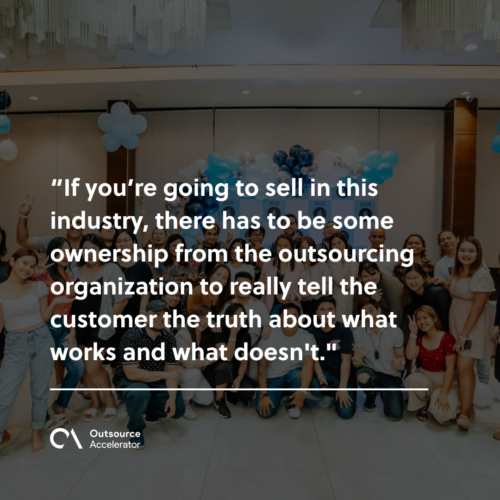Successful outsourcing: What BPOs and clients should do

Outsourcing business processes has become a go-to strategy for many companies. The continuously growing number of business process outsourcing (BPO) firms worldwide attests to the sector’s growth.
Successful outsourcing ventures have helped countless companies accelerate growth and scale their operations. These success stories contributed to the rising popularity of outsourcing as a business solution.
However, first-time outsourcers should be wary of the lure of successful outsourcing.
In a recent episode of the Outsource Accelerator Podcast, Ben Shipley, Trust the Process’ Chief Growth Officer, discusses how outsourcing can be frustrating for some businesses because of false expectations.
But these expectations are not entirely the outsourcer’s fault. As Ben stated, “If you’re going to sell in this industry, there has to be some ownership from the outsourcing organization to really tell the customer the truth about what works and what doesn’t.”
To ensure successful outsourcing investments, businesses and their partner BPOs must put in the necessary effort.

What outsourcing firms get wrong
When it comes to selling their services to customers, there is one thing that BPO firms tend to get wrong.
Quoting Ben again, “I think there is a tendency to sell people what they’re asking for. And this, to me, is where a lot of problems with outsourcing come from.”
Leading businesses to think that BPOs have the answer for every operational problem companies are facing can only lead to disappointments should BPO firms fail to meet expectations.
Outsourcing solutions can help businesses become more efficient, more productive, and more competitive; this much is true. What it fails to mention is that not every BPO firm out there is capable of giving their clients a successful outsourcing journey.
“The main thing is if you’re going to sell in this industry, it is harder because you really have to make sure that your customers have the right expectations…
In a lot of sales, there is a tendency to maybe not give all of the information because you don’t want to scare people off.”
But this is something that BPO firms should avoid doing, according to Ben. Outsourcing is more than just hiring people on behalf of other companies.
It’s helping businesses improve their processes, using past experiences to tell clients what would and wouldn’t work.
“You can’t just help someone hire someone. You have to help them to learn how to be good at outsourcing.”

Dispelling preconceived notions
There are times when people who outsource have preconceived notions of what would happen once they do outsource.
For some, these preconceived ideas are born out of their previous experiences with outsourcing or offshoring. They have an idea of what BPOs can feasibly do for them.
These types of clients can help BPOs help them by giving insights into what worked for them in the past, and how their previous BPO partners did things.
However, some first-time outsourcers may think that outsourcing is a magical problem solver for all their business woes.
Outsourcers, particularly first-timers, need to understand that their ideas of what a BPO firm should be able to do for them sometimes just aren’t doable.
It is the duty of BPO companies to understand where these businesses are in their journey and guide them from there.
“Understanding where they’re at in their journey and then applying appropriate levels of advice … is really important.”
When BPOs meet their clients halfway and work with them to set feasible goals, they take their first joint steps toward successful outsourcing.
Representation helps retention
There’s no successful outsourcing without satisfied employees doing your client’s outsourced work.
BPOs that focus on keeping high retention rates help their clients save costs and achieve efficiency and productivity.
Despite the cost savings that outsourcing offers, businesses can end up not saving that much at all (after factoring everything in) if their BPO partners can’t retain the staff working for them.
BPO firms can help their clients have a successful outsourcing experience by keeping employee morale and satisfaction high.
Many BPOs do this by offering above-market average salaries plus other compensation packages.
Ben Shipley gained helpful knowledge from his years of outsourcing experience: “You have to have an in-country counterpart.”
Having your offshore staff managed by a team leader who doesn’t understand their local workplace culture is spelling disaster for your clients.
Cultures – including workplace culture – will vary from one country to another.
Wherever you’re managing staff from, “you need to have some localized understanding of cultural norms and the norms that exist within business and management.”







 Independent
Independent




